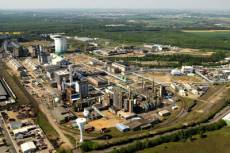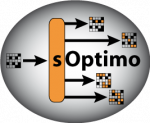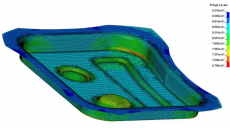Optimization
Current and Former Projects
Multiobjective Control based on Averaging Hausdorff Measure
 This project in cooperation with CINVESTAV-IPN (Mexico City) is partially funded by DAAD and CONACYT. We aim at developing methods, based on the so-called averaging Hausdorff measure, that enable multiobjective algorithms to approximate Pareto fronts with evenly spaced points which is needed for a smooth control of systems.
This project in cooperation with CINVESTAV-IPN (Mexico City) is partially funded by DAAD and CONACYT. We aim at developing methods, based on the so-called averaging Hausdorff measure, that enable multiobjective algorithms to approximate Pareto fronts with evenly spaced points which is needed for a smooth control of systems.
Structure Optimization of Energy Supply Systems


Energy efficiency is a hot topic, because reducing consumption reduces cost and pollution at the same time. When not only one plant, but a system of plants as found in a whole industrial park is considered, savings potential is increased enormously, but so also is the complexity.
Energy consumption of every single plant is not static but depends on factors as environmental temperature, product demand, and energy cost structure, but is also influenced by 'soft' factors as preference decisions done by humans. On the larger scale (the picture on the right shows the chemical park Knapsack near Cologne), the multitude of demands has to be served and ideally, implemented solutions shall cope well with changing demands (new plants, production change leading to energy flow structure changes). We employ evolutionary algorithms at different levels of this highly complex optimization problem.
This project was funded by BMWi and coordinated by the Chair of Technical Thermodynamics at the RWTH Aachen.

Prediction of Forming Processes by Gaussian Process Models
 This project in cooperation with SimuForm GmbH and South Westphalia University of Applied Sciences was funded by BMWi. Its goal was to predict the outcomes of forming processes, e.g. the thickness of the sheet metal, with Gaussian Process Models (GPM), also known as Kriging.
This project in cooperation with SimuForm GmbH and South Westphalia University of Applied Sciences was funded by BMWi. Its goal was to predict the outcomes of forming processes, e.g. the thickness of the sheet metal, with Gaussian Process Models (GPM), also known as Kriging.
Methods/Topics
- Multi-objective optimization using hypervolume-based approaches
- Metamodel-assisted optimization, mainly using Kriging
A large portion of our group's research deals with black-box optimization. We mainly apply evolutionary algorithms (EA) to these problems. EAs have several desireable properties:
- direct search method, no need for gradients
- can handle single-objective and multi-objective problems
- can cope with noisy and dynamic environments
- ideal for parallelization

